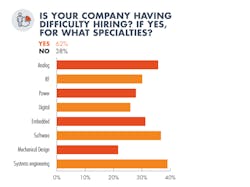Part 1: Engineers Say Jobs Are Changing, Not Getting More Satisfying
Download this article in PDF format.
The pace of engineering is getting faster and faster, and that means electrical engineers are working harder and harder to teach themselves about the latest technology and integrate it into new products. But many remain optimistic about their profession: Nearly 90% of survey respondents say that they enjoy their current jobs, according to Electronic Design’s annual reader survey, which polled around 1,350 engineers.
Nearly two-thirds indicate employers pay them what they deserve, while around 90% say they take pleasure in the challenges that accompany new product design, according to the 2018 Electronic Design Salary Survey. Respondents generally say that persistent concerns about working conditions, outsourcing, and shortsighted management have done little to dull their job satisfaction.
One survey respondent said that electronics engineers can “work on things that can directly impact the way people live, so it is rewarding both financially and from the standpoint of helping out society in general.” Another respondent noted, “The problems to solve are constant and continuously changing, which makes for productive days that don't always blur together out of boredom.”
Other respondents say that engineers must take the good with the bad, the long hours with the intellectual challenges, and high turnover with abundant jobs. Their concerns include shortsighted management and inadequate support by employers for continuous education, which is vital to staying ahead of the latest technology. Outsourcing and offshoring are also feeding fears of layoffs and job losses, respondents say.
“Engineers possess a strong skillset that keeps demand for engineers high and therefore it provides stable employment,” said a survey respondent. “I have found engineering to be challenging in a way that is stimulating and satisfying. The downside is that this constant level of challenge and the need for maintaining and enhancing my skillset can be stressful and fatiguing.”
Despite the challenges and sacrifices of an engineering career, more than two-thirds of respondents say a headhunter has approached them within the last year, suggesting mounting competition for engineering expertise. Employers are slowly boosting compensation and improving health benefits, retention bonuses, and other incentives to fill open engineering positions with more than journeymen and contractors.
“The money is pretty much guaranteed—although you won't get rich as just an engineer—and the employment prospects are always pretty good compared to other professions,” said a survey respondent. “I have never been out of work for more than a couple of weeks.” Another response was typical: “Other professions are likely to be more adversely affected by violent fluctuations in the labor market.”
Job satisfaction can vary significantly depending on where respondents fall on the organizational chart. Almost 12% of staff engineers feel unsatisfied in their current positions, while only 6% of engineering management and 7% of executives feel the same way. Regardless of position, around 90% of respondents would recommend engineering to young people looking to choose a profession.
These recommendations often come with an asterisk. An electrical engineer's pay is higher than many other professions, but many survey respondents feel it makes more sense financially to shift into management roles for the second half of your career. “Your time would be better spent understanding accounting and finance,” said a survey respondent. “Personal satisfaction and self-development don't always pay off.”
Two out of every five survey respondents admit that they have considered walking away from the profession altogether. Around one-third of these respondents say they would follow through to do something more fulfilling or satisfying, while another third would consider switching careers to make more money. Others have contemplated doing something less stressful or starting a new business venture.
“If you are more interested in solving problems than running the show, you want engineering. If you want to be in control, you probably don’t,” said a survey respondent. “The compensation is not on par with the required education, talent, effort, and time commitment,” another noted. “I would only recommend it to those who can find a way to be self-employed.”
The number of available jobs is expanding. In the United States, around 318,300 people are employed in electrical and electronics engineering, excluding more than 66,000 computer hardware engineers, according to the Bureau of Labor Statistics. The profession is projected to grow 7% to about 347,000 over the next decade, ending several years of stagnation.
But at the same time, two-thirds of respondents say that their companies are having trouble filling open engineering positions—a relentless issue in recent years. More than one-third of respondents with hiring troubles are struggling to recruit analog-circuit engineers, while another 39% are fighting over systems engineers. Software and embedded engineers are also in short supply, respondents say.
Companies are also facing challenges recruiting, hiring, and promoting women in engineering positions, as was indicated by one-third of respondents. Despite efforts to make the technology workforce less male-dominated, only around 17% of electrical engineers in the United States are women, according to The Bureau of Labor Statistics. And while almost two-thirds of men say they have not considered leaving the profession, two-thirds of women revealed that they have contemplated it.
Over the last year, the number of survey respondents that believe an engineering shortage exists has jumped from 51% to 63%. Some respondents say that employers are unwilling to train new engineering hires. Others argue that the qualifications for many new jobs are unreasonably broad, giving companies ground to hire workers from other countries on lower salaries or contractors based in the United States.
Electrical engineers are changing jobs more often. The survey showed that the number of respondents who have worked for their current company less than four years has increased from 26% to 38% over the last five years. Only one-tenth of respondents are actively looking for new jobs, while 30% say they would follow up if they heard about an interesting opportunity. Nearly 32% indicate they would listen if personally offered a position.
Dealing with staff reductions is a serious headache for around one-fifth of survey respondents. But they seem to be less concerned about major layoffs—40% of respondents said that their company was going to increase engineering staff over the next year, 50% said that staffing would stay the same, and the remainder foresee cuts—and more about replacing employees with specific engineering chops.
Some respondents expressed that they are engineering themselves out of jobs: “New engineers can be replaced with off-the-shelf components, so there is little chance for advancement unless you are working at a company that makes the electronic subsystems.” Other respondents echoed that shift: “The engineering profession is becoming more and more commoditized. Upper management views engineering as an easily replaceable resource.”
More than one-third of respondents feel that their employers are shortchanging them. The consensus among these respondents is that 20% higher pay on average would bring them to market value. Many say that what they put into the profession—respondents report working an average of 50 hours per week, not including time on call—are not worth what employers are paying them.
For some, engineering is losing its luster: “Engineers no longer, by and large, run technology companies the way they used to. Technology used to be exciting, now it's everywhere and engineers have been reduced to worker bees.” Another noted: “Engineering opportunities are changing. It is slowly becoming more craft than profession. More importance will be given to those who can create novel applications than engineer novel solutions.”
Still, many respondents describe engineering as an occupation that you don’t choose as much as it chooses you. “It is a challenging and emotionally rewarding field. But if someone is not a natural engineer, there are other fields that require less work and pay much better,” a respondent explained. Another respondent, who advised young people to stay away from an engineering career, warned: “It's a job you cannot leave at the office.”
About the Author
James Morra
Senior Editor
James Morra is the senior editor for Electronic Design, covering the semiconductor industry and new technology trends, with a focus on power electronics and power management. He also reports on the business behind electrical engineering, including the electronics supply chain. He joined Electronic Design in 2015 and is based in Chicago, Illinois.








